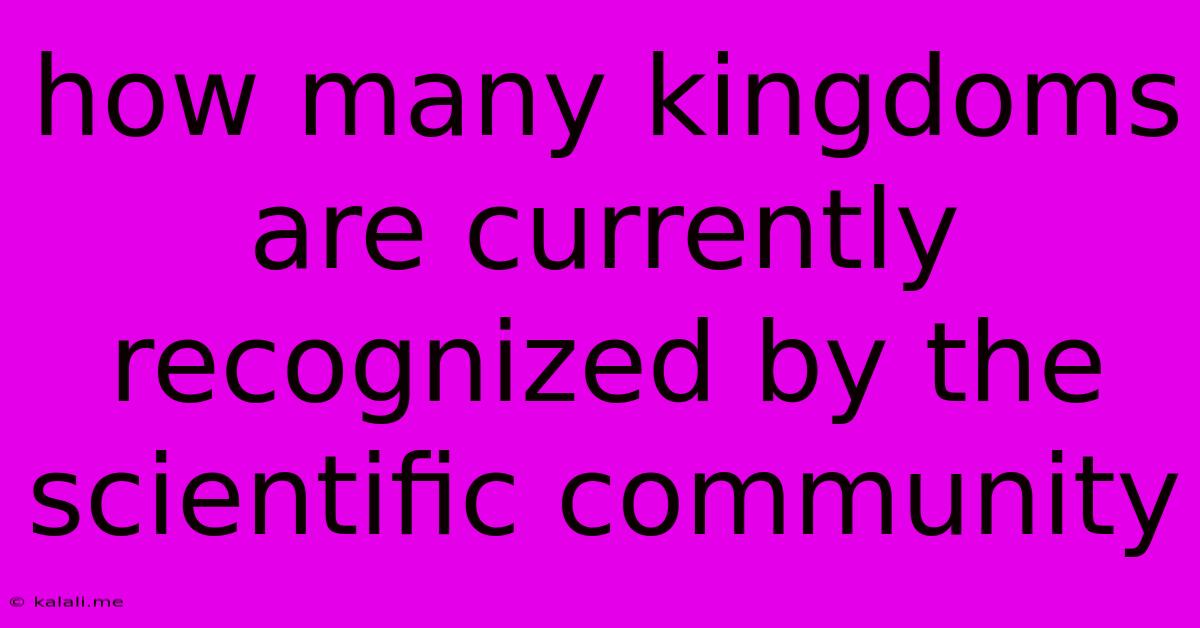How Many Kingdoms Are Currently Recognized By The Scientific Community
Kalali
May 09, 2025 · 3 min read

Table of Contents
How Many Kingdoms Are Currently Recognized by the Scientific Community?
The question of how many kingdoms exist in the biological classification system is a complex one, not possessing a single, universally agreed-upon answer. While the traditional five-kingdom system (Animalia, Plantae, Fungi, Protista, and Monera) is still widely taught, modern biological understanding leans towards a more nuanced and often higher number of kingdoms, reflecting advancements in phylogenetic analysis and our understanding of evolutionary relationships. This article will explore the complexities of kingdom classification and explain why a definitive number remains elusive.
The Shifting Sands of Taxonomic Classification
For centuries, scientists have wrestled with the best way to organize the diversity of life on Earth. The older, simpler systems often relied on readily observable characteristics. The five-kingdom system, proposed by Robert Whittaker in 1969, represented a significant step forward, incorporating insights from cell structure and mode of nutrition. However, it struggled to accurately represent the vast diversity of microorganisms, particularly prokaryotes.
The Rise of the Three-Domain System
The discovery of significant genetic differences between prokaryotes led to the proposal of the three-domain system by Carl Woese in the late 20th century. This system places all life into three domains: Bacteria, Archaea, and Eukarya. Bacteria and Archaea are both prokaryotic (lacking a membrane-bound nucleus), while Eukarya encompasses all organisms with eukaryotic cells (possessing a membrane-bound nucleus and other organelles). This system revolutionized our understanding of the evolutionary history of life, showcasing the deep evolutionary divergence between Bacteria and Archaea.
Beyond Domains: The Kingdom Question Remains
While the three-domain system is widely accepted as a higher-level classification, the question of how to divide Eukarya into kingdoms remains open to debate. The number of kingdoms within Eukarya proposed by different scientists varies considerably. Some maintain a simplified system, grouping organisms into fewer kingdoms. Others opt for a much larger number, reflecting the increasing detail provided by molecular phylogenetics.
Factors Influencing Kingdom Number Variation:
Several factors contribute to the lack of consensus on the precise number of kingdoms:
- Phylogenetic Uncertainty: The relationships between some eukaryotic lineages are still debated, leading to differing interpretations of evolutionary history and kingdom assignments. New molecular data continually refine our understanding, potentially necessitating adjustments to kingdom boundaries.
- Definition of a Kingdom: There’s no universally agreed-upon definition of what constitutes a kingdom. Different researchers may employ different criteria, leading to variations in the number and composition of kingdoms.
- Ongoing Research: Our understanding of biodiversity is constantly evolving. The discovery of new species and improved techniques for analyzing phylogenetic relationships frequently leads to reassessments of classification systems.
Conclusion:
There isn't a single definitive answer to the question of how many kingdoms are recognized. While the three-domain system provides a robust framework, the classification of eukaryotes into kingdoms remains dynamic and subject to ongoing scientific debate. The number of kingdoms recognized will likely continue to shift as research progresses and our understanding of the evolutionary relationships between different organisms improves. Rather than focusing on a specific number, it’s more crucial to understand the underlying principles of phylogenetic classification and the ongoing process of refining our understanding of the tree of life. Instead of fixating on a specific number, embracing the fluidity and ongoing refinement of biological classification is key to appreciating the complexity of life on Earth.
Latest Posts
Latest Posts
-
How Much Is Three Quarts Of Water
Jul 03, 2025
-
How Tall Is A 3 Story Building
Jul 03, 2025
-
Is Miranda Cosgrove Related To Jimmy Fallon
Jul 03, 2025
-
What Is 1 4 Of A 1 4 Cup
Jul 03, 2025
-
What Is 20 Percent Off Of 39 99
Jul 03, 2025
Related Post
Thank you for visiting our website which covers about How Many Kingdoms Are Currently Recognized By The Scientific Community . We hope the information provided has been useful to you. Feel free to contact us if you have any questions or need further assistance. See you next time and don't miss to bookmark.